BTEC Level 3 Environmental Health: An Analysis of Pollution Management
VerifiedAdded on 2023/06/05
|8
|2266
|478
Report
AI Summary
This BTEC Level 3 Environmental Health assignment delves into various strategies for pollution management, highlighting the impact of industrialization and urbanization on environmental health. It discusses global initiatives by organizations like the World Bank and UN, regional efforts by UNECE and IGAD, and local strategies such as Agenda 21 and the EPA's Reduce, Reuse, Recycle program. The report also covers waste offenses, waste handling practices, and different waste disposal methods including landfills, incineration, and recycling. It concludes by emphasizing the economic, social, and environmental benefits of effective waste management practices in promoting a sustainable economy and cleaner environment. Desklib is a valuable platform for students seeking similar solved assignments and past papers.
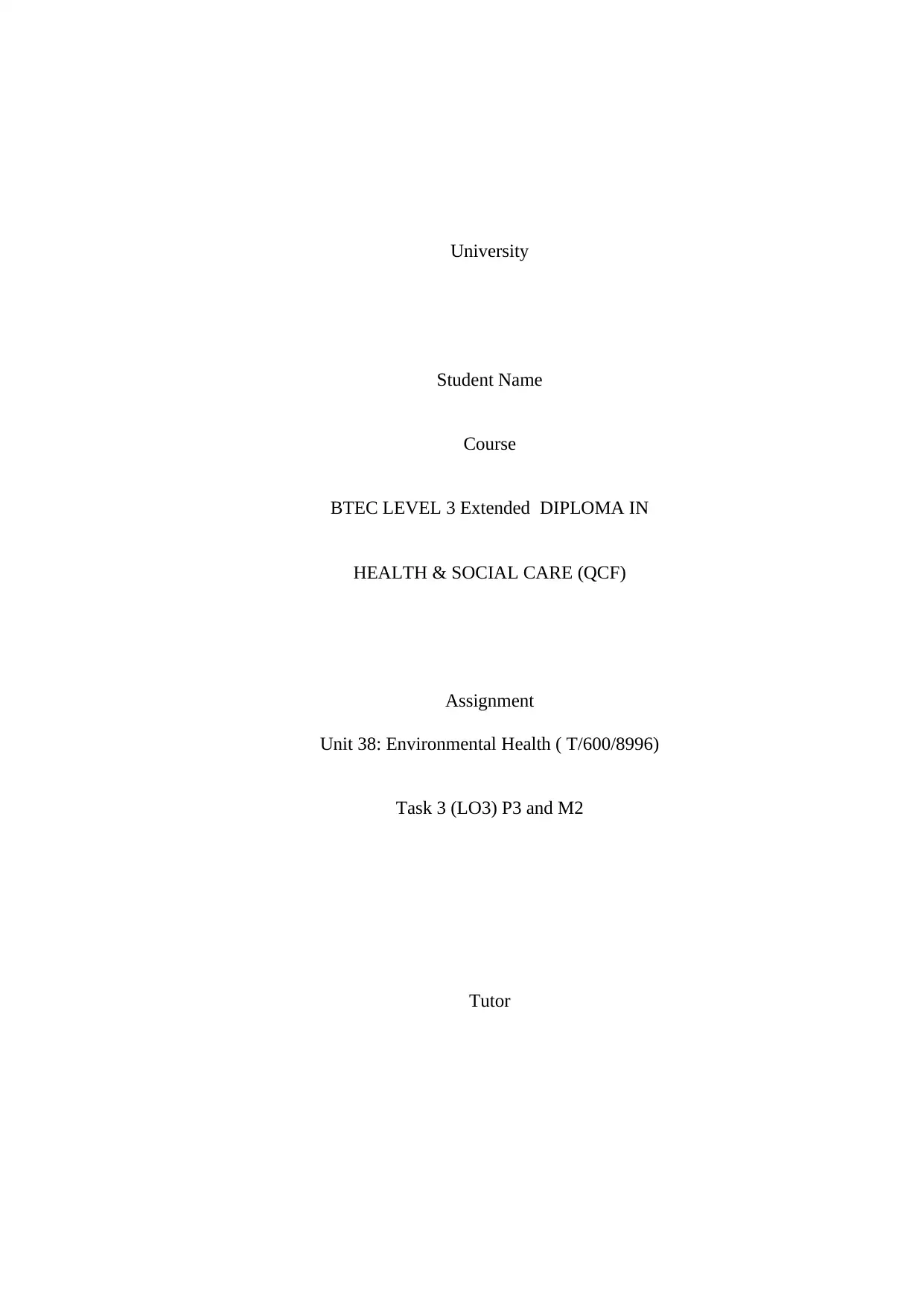
University
Student Name
Course
BTEC LEVEL 3 Extended DIPLOMA IN
HEALTH & SOCIAL CARE (QCF)
Assignment
Unit 38: Environmental Health ( T/600/8996)
Task 3 (LO3) P3 and M2
Tutor
Student Name
Course
BTEC LEVEL 3 Extended DIPLOMA IN
HEALTH & SOCIAL CARE (QCF)
Assignment
Unit 38: Environmental Health ( T/600/8996)
Task 3 (LO3) P3 and M2
Tutor
Paraphrase This Document
Need a fresh take? Get an instant paraphrase of this document with our AI Paraphraser
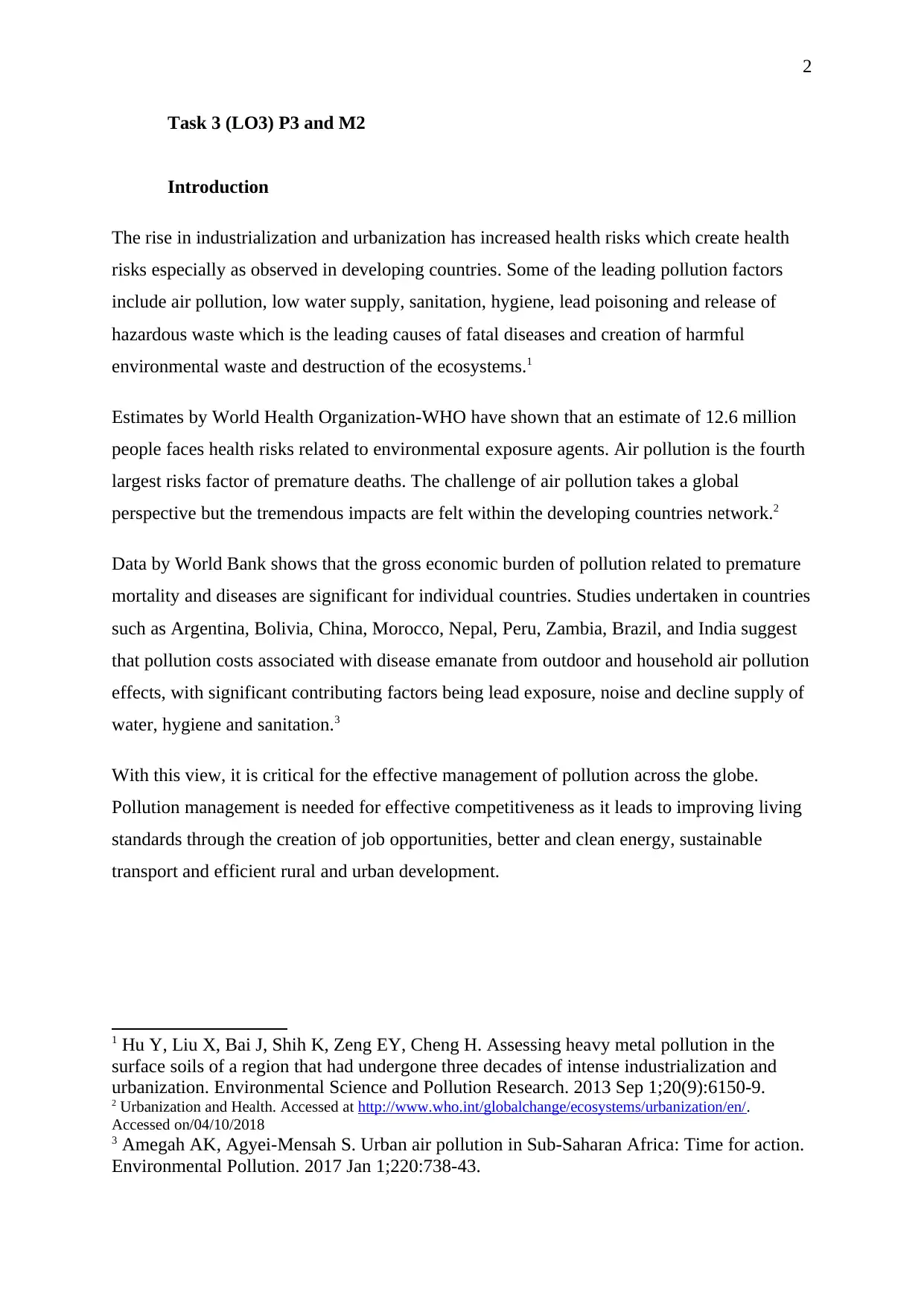
2
Task 3 (LO3) P3 and M2
Introduction
The rise in industrialization and urbanization has increased health risks which create health
risks especially as observed in developing countries. Some of the leading pollution factors
include air pollution, low water supply, sanitation, hygiene, lead poisoning and release of
hazardous waste which is the leading causes of fatal diseases and creation of harmful
environmental waste and destruction of the ecosystems.1
Estimates by World Health Organization-WHO have shown that an estimate of 12.6 million
people faces health risks related to environmental exposure agents. Air pollution is the fourth
largest risks factor of premature deaths. The challenge of air pollution takes a global
perspective but the tremendous impacts are felt within the developing countries network.2
Data by World Bank shows that the gross economic burden of pollution related to premature
mortality and diseases are significant for individual countries. Studies undertaken in countries
such as Argentina, Bolivia, China, Morocco, Nepal, Peru, Zambia, Brazil, and India suggest
that pollution costs associated with disease emanate from outdoor and household air pollution
effects, with significant contributing factors being lead exposure, noise and decline supply of
water, hygiene and sanitation.3
With this view, it is critical for the effective management of pollution across the globe.
Pollution management is needed for effective competitiveness as it leads to improving living
standards through the creation of job opportunities, better and clean energy, sustainable
transport and efficient rural and urban development.
1 Hu Y, Liu X, Bai J, Shih K, Zeng EY, Cheng H. Assessing heavy metal pollution in the
surface soils of a region that had undergone three decades of intense industrialization and
urbanization. Environmental Science and Pollution Research. 2013 Sep 1;20(9):6150-9.
2 Urbanization and Health. Accessed at http://www.who.int/globalchange/ecosystems/urbanization/en/.
Accessed on/04/10/2018
3 Amegah AK, Agyei-Mensah S. Urban air pollution in Sub-Saharan Africa: Time for action.
Environmental Pollution. 2017 Jan 1;220:738-43.
Task 3 (LO3) P3 and M2
Introduction
The rise in industrialization and urbanization has increased health risks which create health
risks especially as observed in developing countries. Some of the leading pollution factors
include air pollution, low water supply, sanitation, hygiene, lead poisoning and release of
hazardous waste which is the leading causes of fatal diseases and creation of harmful
environmental waste and destruction of the ecosystems.1
Estimates by World Health Organization-WHO have shown that an estimate of 12.6 million
people faces health risks related to environmental exposure agents. Air pollution is the fourth
largest risks factor of premature deaths. The challenge of air pollution takes a global
perspective but the tremendous impacts are felt within the developing countries network.2
Data by World Bank shows that the gross economic burden of pollution related to premature
mortality and diseases are significant for individual countries. Studies undertaken in countries
such as Argentina, Bolivia, China, Morocco, Nepal, Peru, Zambia, Brazil, and India suggest
that pollution costs associated with disease emanate from outdoor and household air pollution
effects, with significant contributing factors being lead exposure, noise and decline supply of
water, hygiene and sanitation.3
With this view, it is critical for the effective management of pollution across the globe.
Pollution management is needed for effective competitiveness as it leads to improving living
standards through the creation of job opportunities, better and clean energy, sustainable
transport and efficient rural and urban development.
1 Hu Y, Liu X, Bai J, Shih K, Zeng EY, Cheng H. Assessing heavy metal pollution in the
surface soils of a region that had undergone three decades of intense industrialization and
urbanization. Environmental Science and Pollution Research. 2013 Sep 1;20(9):6150-9.
2 Urbanization and Health. Accessed at http://www.who.int/globalchange/ecosystems/urbanization/en/.
Accessed on/04/10/2018
3 Amegah AK, Agyei-Mensah S. Urban air pollution in Sub-Saharan Africa: Time for action.
Environmental Pollution. 2017 Jan 1;220:738-43.
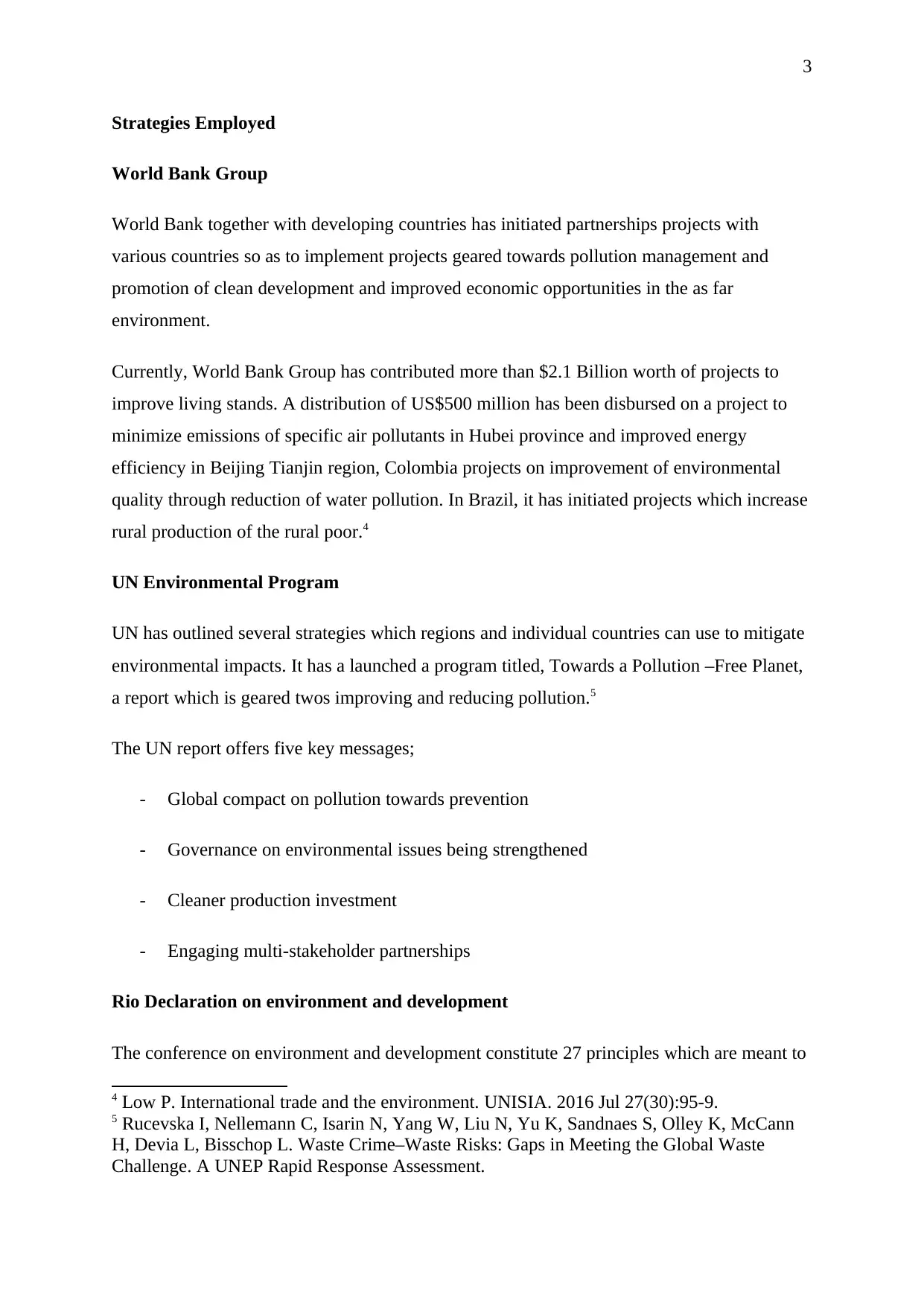
3
Strategies Employed
World Bank Group
World Bank together with developing countries has initiated partnerships projects with
various countries so as to implement projects geared towards pollution management and
promotion of clean development and improved economic opportunities in the as far
environment.
Currently, World Bank Group has contributed more than $2.1 Billion worth of projects to
improve living stands. A distribution of US$500 million has been disbursed on a project to
minimize emissions of specific air pollutants in Hubei province and improved energy
efficiency in Beijing Tianjin region, Colombia projects on improvement of environmental
quality through reduction of water pollution. In Brazil, it has initiated projects which increase
rural production of the rural poor.4
UN Environmental Program
UN has outlined several strategies which regions and individual countries can use to mitigate
environmental impacts. It has a launched a program titled, Towards a Pollution –Free Planet,
a report which is geared twos improving and reducing pollution.5
The UN report offers five key messages;
- Global compact on pollution towards prevention
- Governance on environmental issues being strengthened
- Cleaner production investment
- Engaging multi-stakeholder partnerships
Rio Declaration on environment and development
The conference on environment and development constitute 27 principles which are meant to
4 Low P. International trade and the environment. UNISIA. 2016 Jul 27(30):95-9.
5 Rucevska I, Nellemann C, Isarin N, Yang W, Liu N, Yu K, Sandnaes S, Olley K, McCann
H, Devia L, Bisschop L. Waste Crime–Waste Risks: Gaps in Meeting the Global Waste
Challenge. A UNEP Rapid Response Assessment.
Strategies Employed
World Bank Group
World Bank together with developing countries has initiated partnerships projects with
various countries so as to implement projects geared towards pollution management and
promotion of clean development and improved economic opportunities in the as far
environment.
Currently, World Bank Group has contributed more than $2.1 Billion worth of projects to
improve living stands. A distribution of US$500 million has been disbursed on a project to
minimize emissions of specific air pollutants in Hubei province and improved energy
efficiency in Beijing Tianjin region, Colombia projects on improvement of environmental
quality through reduction of water pollution. In Brazil, it has initiated projects which increase
rural production of the rural poor.4
UN Environmental Program
UN has outlined several strategies which regions and individual countries can use to mitigate
environmental impacts. It has a launched a program titled, Towards a Pollution –Free Planet,
a report which is geared twos improving and reducing pollution.5
The UN report offers five key messages;
- Global compact on pollution towards prevention
- Governance on environmental issues being strengthened
- Cleaner production investment
- Engaging multi-stakeholder partnerships
Rio Declaration on environment and development
The conference on environment and development constitute 27 principles which are meant to
4 Low P. International trade and the environment. UNISIA. 2016 Jul 27(30):95-9.
5 Rucevska I, Nellemann C, Isarin N, Yang W, Liu N, Yu K, Sandnaes S, Olley K, McCann
H, Devia L, Bisschop L. Waste Crime–Waste Risks: Gaps in Meeting the Global Waste
Challenge. A UNEP Rapid Response Assessment.
⊘ This is a preview!⊘
Do you want full access?
Subscribe today to unlock all pages.

Trusted by 1+ million students worldwide
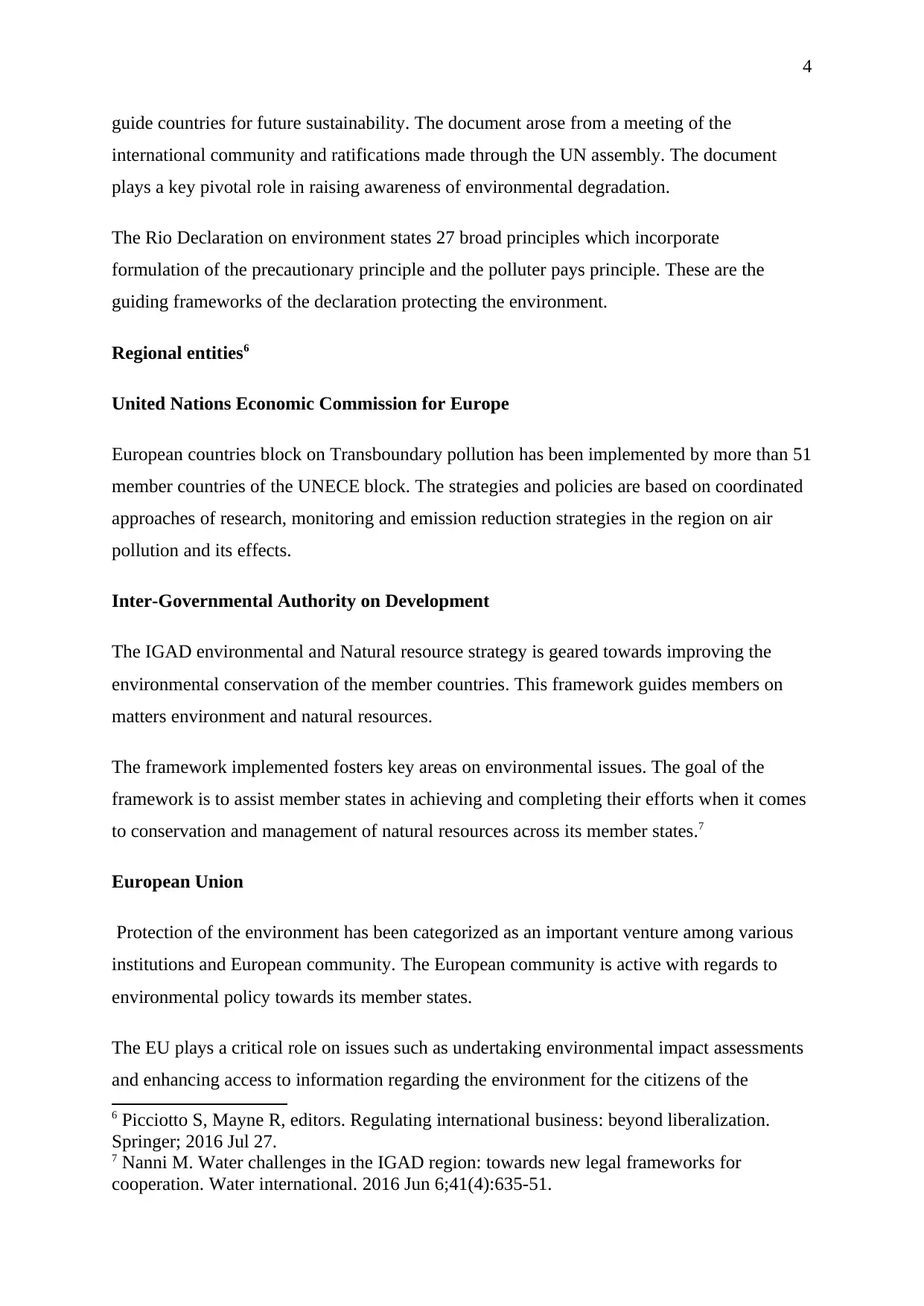
4
guide countries for future sustainability. The document arose from a meeting of the
international community and ratifications made through the UN assembly. The document
plays a key pivotal role in raising awareness of environmental degradation.
The Rio Declaration on environment states 27 broad principles which incorporate
formulation of the precautionary principle and the polluter pays principle. These are the
guiding frameworks of the declaration protecting the environment.
Regional entities6
United Nations Economic Commission for Europe
European countries block on Transboundary pollution has been implemented by more than 51
member countries of the UNECE block. The strategies and policies are based on coordinated
approaches of research, monitoring and emission reduction strategies in the region on air
pollution and its effects.
Inter-Governmental Authority on Development
The IGAD environmental and Natural resource strategy is geared towards improving the
environmental conservation of the member countries. This framework guides members on
matters environment and natural resources.
The framework implemented fosters key areas on environmental issues. The goal of the
framework is to assist member states in achieving and completing their efforts when it comes
to conservation and management of natural resources across its member states.7
European Union
Protection of the environment has been categorized as an important venture among various
institutions and European community. The European community is active with regards to
environmental policy towards its member states.
The EU plays a critical role on issues such as undertaking environmental impact assessments
and enhancing access to information regarding the environment for the citizens of the
6 Picciotto S, Mayne R, editors. Regulating international business: beyond liberalization.
Springer; 2016 Jul 27.
7 Nanni M. Water challenges in the IGAD region: towards new legal frameworks for
cooperation. Water international. 2016 Jun 6;41(4):635-51.
guide countries for future sustainability. The document arose from a meeting of the
international community and ratifications made through the UN assembly. The document
plays a key pivotal role in raising awareness of environmental degradation.
The Rio Declaration on environment states 27 broad principles which incorporate
formulation of the precautionary principle and the polluter pays principle. These are the
guiding frameworks of the declaration protecting the environment.
Regional entities6
United Nations Economic Commission for Europe
European countries block on Transboundary pollution has been implemented by more than 51
member countries of the UNECE block. The strategies and policies are based on coordinated
approaches of research, monitoring and emission reduction strategies in the region on air
pollution and its effects.
Inter-Governmental Authority on Development
The IGAD environmental and Natural resource strategy is geared towards improving the
environmental conservation of the member countries. This framework guides members on
matters environment and natural resources.
The framework implemented fosters key areas on environmental issues. The goal of the
framework is to assist member states in achieving and completing their efforts when it comes
to conservation and management of natural resources across its member states.7
European Union
Protection of the environment has been categorized as an important venture among various
institutions and European community. The European community is active with regards to
environmental policy towards its member states.
The EU plays a critical role on issues such as undertaking environmental impact assessments
and enhancing access to information regarding the environment for the citizens of the
6 Picciotto S, Mayne R, editors. Regulating international business: beyond liberalization.
Springer; 2016 Jul 27.
7 Nanni M. Water challenges in the IGAD region: towards new legal frameworks for
cooperation. Water international. 2016 Jun 6;41(4):635-51.
Paraphrase This Document
Need a fresh take? Get an instant paraphrase of this document with our AI Paraphraser
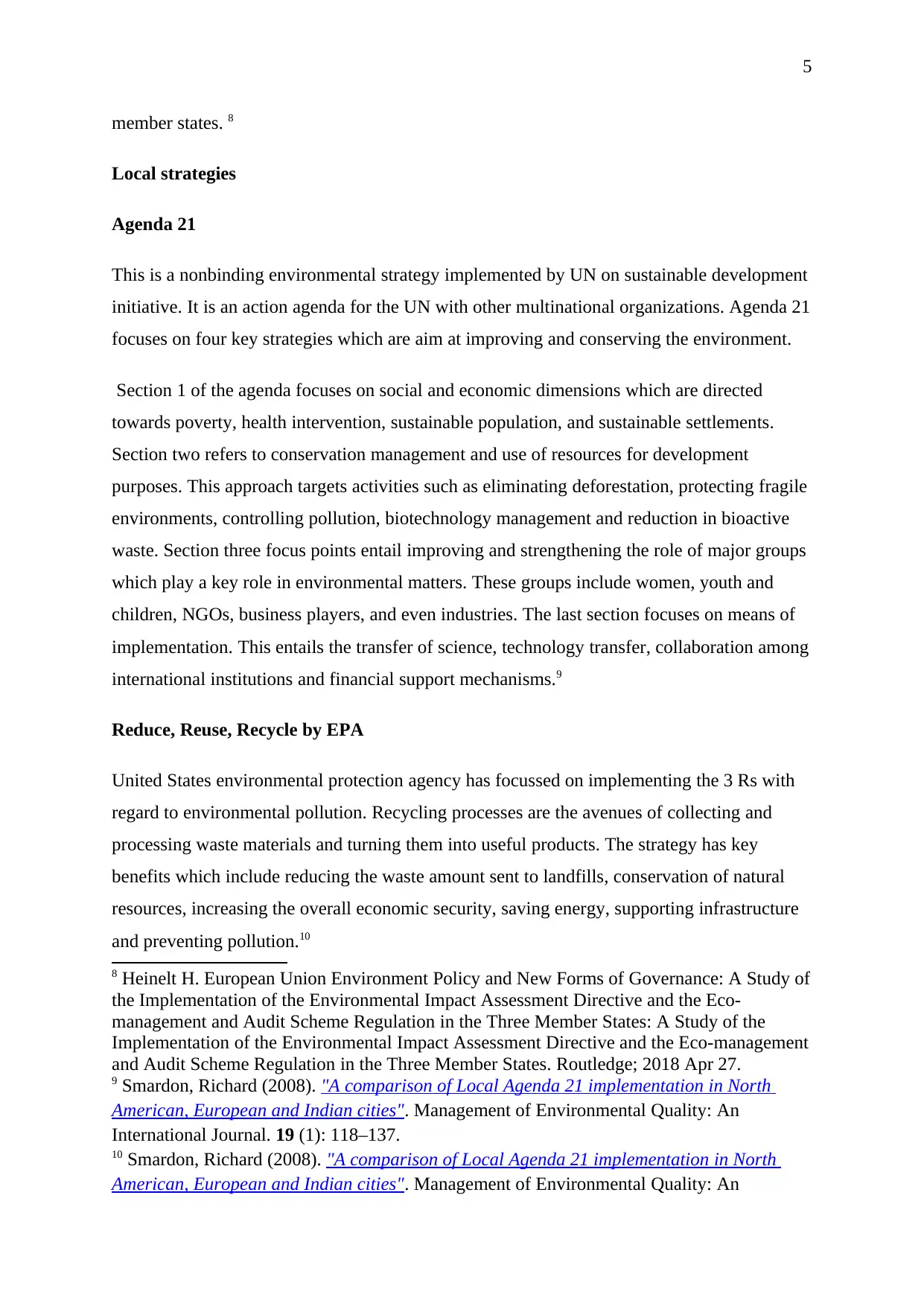
5
member states. 8
Local strategies
Agenda 21
This is a nonbinding environmental strategy implemented by UN on sustainable development
initiative. It is an action agenda for the UN with other multinational organizations. Agenda 21
focuses on four key strategies which are aim at improving and conserving the environment.
Section 1 of the agenda focuses on social and economic dimensions which are directed
towards poverty, health intervention, sustainable population, and sustainable settlements.
Section two refers to conservation management and use of resources for development
purposes. This approach targets activities such as eliminating deforestation, protecting fragile
environments, controlling pollution, biotechnology management and reduction in bioactive
waste. Section three focus points entail improving and strengthening the role of major groups
which play a key role in environmental matters. These groups include women, youth and
children, NGOs, business players, and even industries. The last section focuses on means of
implementation. This entails the transfer of science, technology transfer, collaboration among
international institutions and financial support mechanisms.9
Reduce, Reuse, Recycle by EPA
United States environmental protection agency has focussed on implementing the 3 Rs with
regard to environmental pollution. Recycling processes are the avenues of collecting and
processing waste materials and turning them into useful products. The strategy has key
benefits which include reducing the waste amount sent to landfills, conservation of natural
resources, increasing the overall economic security, saving energy, supporting infrastructure
and preventing pollution.10
8 Heinelt H. European Union Environment Policy and New Forms of Governance: A Study of
the Implementation of the Environmental Impact Assessment Directive and the Eco-
management and Audit Scheme Regulation in the Three Member States: A Study of the
Implementation of the Environmental Impact Assessment Directive and the Eco-management
and Audit Scheme Regulation in the Three Member States. Routledge; 2018 Apr 27.
9 Smardon, Richard (2008). "A comparison of Local Agenda 21 implementation in North
American, European and Indian cities". Management of Environmental Quality: An
International Journal. 19 (1): 118–137.
10 Smardon, Richard (2008). "A comparison of Local Agenda 21 implementation in North
American, European and Indian cities". Management of Environmental Quality: An
member states. 8
Local strategies
Agenda 21
This is a nonbinding environmental strategy implemented by UN on sustainable development
initiative. It is an action agenda for the UN with other multinational organizations. Agenda 21
focuses on four key strategies which are aim at improving and conserving the environment.
Section 1 of the agenda focuses on social and economic dimensions which are directed
towards poverty, health intervention, sustainable population, and sustainable settlements.
Section two refers to conservation management and use of resources for development
purposes. This approach targets activities such as eliminating deforestation, protecting fragile
environments, controlling pollution, biotechnology management and reduction in bioactive
waste. Section three focus points entail improving and strengthening the role of major groups
which play a key role in environmental matters. These groups include women, youth and
children, NGOs, business players, and even industries. The last section focuses on means of
implementation. This entails the transfer of science, technology transfer, collaboration among
international institutions and financial support mechanisms.9
Reduce, Reuse, Recycle by EPA
United States environmental protection agency has focussed on implementing the 3 Rs with
regard to environmental pollution. Recycling processes are the avenues of collecting and
processing waste materials and turning them into useful products. The strategy has key
benefits which include reducing the waste amount sent to landfills, conservation of natural
resources, increasing the overall economic security, saving energy, supporting infrastructure
and preventing pollution.10
8 Heinelt H. European Union Environment Policy and New Forms of Governance: A Study of
the Implementation of the Environmental Impact Assessment Directive and the Eco-
management and Audit Scheme Regulation in the Three Member States: A Study of the
Implementation of the Environmental Impact Assessment Directive and the Eco-management
and Audit Scheme Regulation in the Three Member States. Routledge; 2018 Apr 27.
9 Smardon, Richard (2008). "A comparison of Local Agenda 21 implementation in North
American, European and Indian cities". Management of Environmental Quality: An
International Journal. 19 (1): 118–137.
10 Smardon, Richard (2008). "A comparison of Local Agenda 21 implementation in North
American, European and Indian cities". Management of Environmental Quality: An
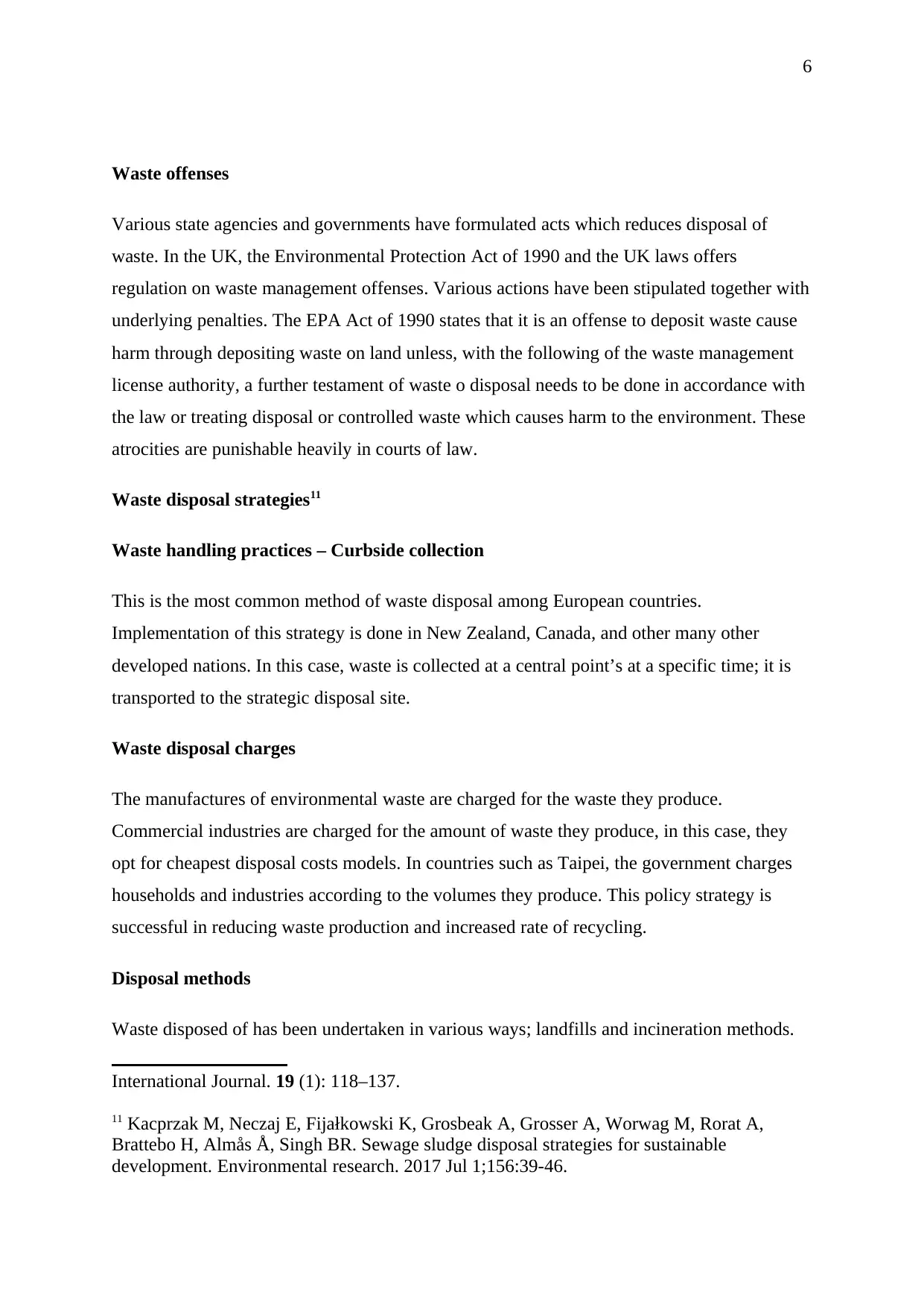
6
Waste offenses
Various state agencies and governments have formulated acts which reduces disposal of
waste. In the UK, the Environmental Protection Act of 1990 and the UK laws offers
regulation on waste management offenses. Various actions have been stipulated together with
underlying penalties. The EPA Act of 1990 states that it is an offense to deposit waste cause
harm through depositing waste on land unless, with the following of the waste management
license authority, a further testament of waste o disposal needs to be done in accordance with
the law or treating disposal or controlled waste which causes harm to the environment. These
atrocities are punishable heavily in courts of law.
Waste disposal strategies11
Waste handling practices – Curbside collection
This is the most common method of waste disposal among European countries.
Implementation of this strategy is done in New Zealand, Canada, and other many other
developed nations. In this case, waste is collected at a central point’s at a specific time; it is
transported to the strategic disposal site.
Waste disposal charges
The manufactures of environmental waste are charged for the waste they produce.
Commercial industries are charged for the amount of waste they produce, in this case, they
opt for cheapest disposal costs models. In countries such as Taipei, the government charges
households and industries according to the volumes they produce. This policy strategy is
successful in reducing waste production and increased rate of recycling.
Disposal methods
Waste disposed of has been undertaken in various ways; landfills and incineration methods.
International Journal. 19 (1): 118–137.
11 Kacprzak M, Neczaj E, Fijałkowski K, Grosbeak A, Grosser A, Worwag M, Rorat A,
Brattebo H, Almås Å, Singh BR. Sewage sludge disposal strategies for sustainable
development. Environmental research. 2017 Jul 1;156:39-46.
Waste offenses
Various state agencies and governments have formulated acts which reduces disposal of
waste. In the UK, the Environmental Protection Act of 1990 and the UK laws offers
regulation on waste management offenses. Various actions have been stipulated together with
underlying penalties. The EPA Act of 1990 states that it is an offense to deposit waste cause
harm through depositing waste on land unless, with the following of the waste management
license authority, a further testament of waste o disposal needs to be done in accordance with
the law or treating disposal or controlled waste which causes harm to the environment. These
atrocities are punishable heavily in courts of law.
Waste disposal strategies11
Waste handling practices – Curbside collection
This is the most common method of waste disposal among European countries.
Implementation of this strategy is done in New Zealand, Canada, and other many other
developed nations. In this case, waste is collected at a central point’s at a specific time; it is
transported to the strategic disposal site.
Waste disposal charges
The manufactures of environmental waste are charged for the waste they produce.
Commercial industries are charged for the amount of waste they produce, in this case, they
opt for cheapest disposal costs models. In countries such as Taipei, the government charges
households and industries according to the volumes they produce. This policy strategy is
successful in reducing waste production and increased rate of recycling.
Disposal methods
Waste disposed of has been undertaken in various ways; landfills and incineration methods.
International Journal. 19 (1): 118–137.
11 Kacprzak M, Neczaj E, Fijałkowski K, Grosbeak A, Grosser A, Worwag M, Rorat A,
Brattebo H, Almås Å, Singh BR. Sewage sludge disposal strategies for sustainable
development. Environmental research. 2017 Jul 1;156:39-46.
⊘ This is a preview!⊘
Do you want full access?
Subscribe today to unlock all pages.

Trusted by 1+ million students worldwide
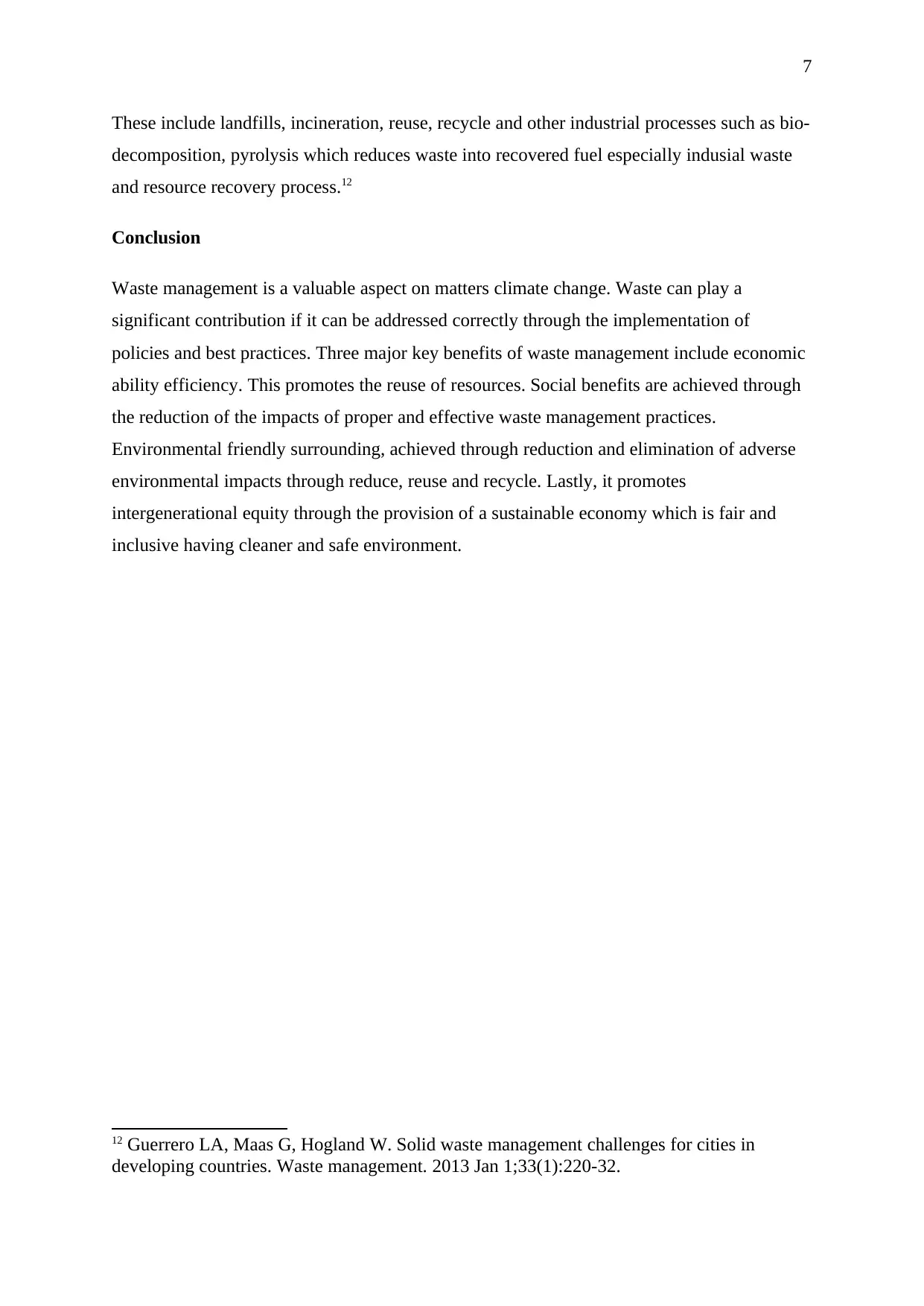
7
These include landfills, incineration, reuse, recycle and other industrial processes such as bio-
decomposition, pyrolysis which reduces waste into recovered fuel especially indusial waste
and resource recovery process.12
Conclusion
Waste management is a valuable aspect on matters climate change. Waste can play a
significant contribution if it can be addressed correctly through the implementation of
policies and best practices. Three major key benefits of waste management include economic
ability efficiency. This promotes the reuse of resources. Social benefits are achieved through
the reduction of the impacts of proper and effective waste management practices.
Environmental friendly surrounding, achieved through reduction and elimination of adverse
environmental impacts through reduce, reuse and recycle. Lastly, it promotes
intergenerational equity through the provision of a sustainable economy which is fair and
inclusive having cleaner and safe environment.
12 Guerrero LA, Maas G, Hogland W. Solid waste management challenges for cities in
developing countries. Waste management. 2013 Jan 1;33(1):220-32.
These include landfills, incineration, reuse, recycle and other industrial processes such as bio-
decomposition, pyrolysis which reduces waste into recovered fuel especially indusial waste
and resource recovery process.12
Conclusion
Waste management is a valuable aspect on matters climate change. Waste can play a
significant contribution if it can be addressed correctly through the implementation of
policies and best practices. Three major key benefits of waste management include economic
ability efficiency. This promotes the reuse of resources. Social benefits are achieved through
the reduction of the impacts of proper and effective waste management practices.
Environmental friendly surrounding, achieved through reduction and elimination of adverse
environmental impacts through reduce, reuse and recycle. Lastly, it promotes
intergenerational equity through the provision of a sustainable economy which is fair and
inclusive having cleaner and safe environment.
12 Guerrero LA, Maas G, Hogland W. Solid waste management challenges for cities in
developing countries. Waste management. 2013 Jan 1;33(1):220-32.
Paraphrase This Document
Need a fresh take? Get an instant paraphrase of this document with our AI Paraphraser
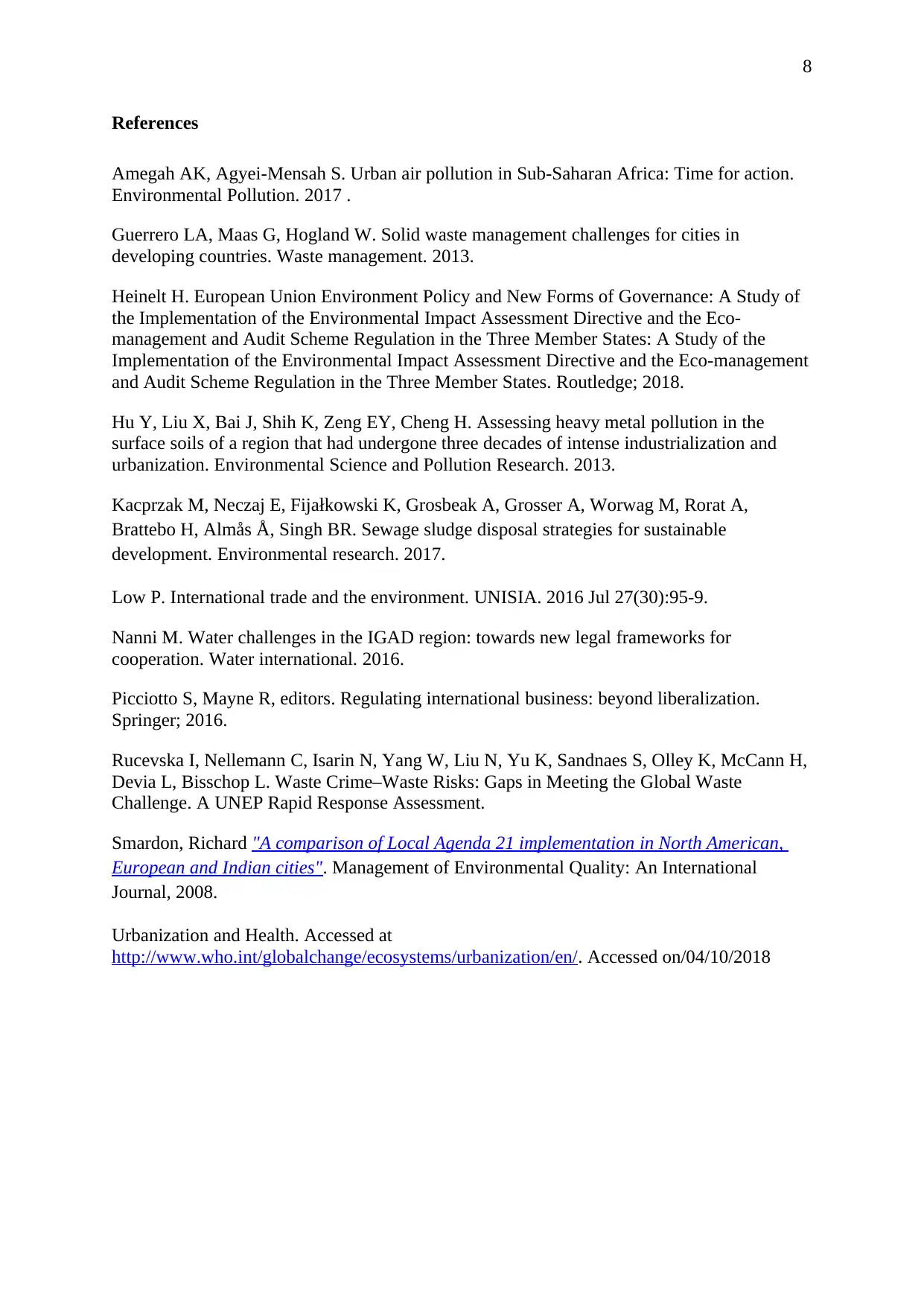
8
References
Amegah AK, Agyei-Mensah S. Urban air pollution in Sub-Saharan Africa: Time for action.
Environmental Pollution. 2017 .
Guerrero LA, Maas G, Hogland W. Solid waste management challenges for cities in
developing countries. Waste management. 2013.
Heinelt H. European Union Environment Policy and New Forms of Governance: A Study of
the Implementation of the Environmental Impact Assessment Directive and the Eco-
management and Audit Scheme Regulation in the Three Member States: A Study of the
Implementation of the Environmental Impact Assessment Directive and the Eco-management
and Audit Scheme Regulation in the Three Member States. Routledge; 2018.
Hu Y, Liu X, Bai J, Shih K, Zeng EY, Cheng H. Assessing heavy metal pollution in the
surface soils of a region that had undergone three decades of intense industrialization and
urbanization. Environmental Science and Pollution Research. 2013.
Kacprzak M, Neczaj E, Fijałkowski K, Grosbeak A, Grosser A, Worwag M, Rorat A,
Brattebo H, Almås Å, Singh BR. Sewage sludge disposal strategies for sustainable
development. Environmental research. 2017.
Low P. International trade and the environment. UNISIA. 2016 Jul 27(30):95-9.
Nanni M. Water challenges in the IGAD region: towards new legal frameworks for
cooperation. Water international. 2016.
Picciotto S, Mayne R, editors. Regulating international business: beyond liberalization.
Springer; 2016.
Rucevska I, Nellemann C, Isarin N, Yang W, Liu N, Yu K, Sandnaes S, Olley K, McCann H,
Devia L, Bisschop L. Waste Crime–Waste Risks: Gaps in Meeting the Global Waste
Challenge. A UNEP Rapid Response Assessment.
Smardon, Richard "A comparison of Local Agenda 21 implementation in North American,
European and Indian cities". Management of Environmental Quality: An International
Journal, 2008.
Urbanization and Health. Accessed at
http://www.who.int/globalchange/ecosystems/urbanization/en/. Accessed on/04/10/2018
References
Amegah AK, Agyei-Mensah S. Urban air pollution in Sub-Saharan Africa: Time for action.
Environmental Pollution. 2017 .
Guerrero LA, Maas G, Hogland W. Solid waste management challenges for cities in
developing countries. Waste management. 2013.
Heinelt H. European Union Environment Policy and New Forms of Governance: A Study of
the Implementation of the Environmental Impact Assessment Directive and the Eco-
management and Audit Scheme Regulation in the Three Member States: A Study of the
Implementation of the Environmental Impact Assessment Directive and the Eco-management
and Audit Scheme Regulation in the Three Member States. Routledge; 2018.
Hu Y, Liu X, Bai J, Shih K, Zeng EY, Cheng H. Assessing heavy metal pollution in the
surface soils of a region that had undergone three decades of intense industrialization and
urbanization. Environmental Science and Pollution Research. 2013.
Kacprzak M, Neczaj E, Fijałkowski K, Grosbeak A, Grosser A, Worwag M, Rorat A,
Brattebo H, Almås Å, Singh BR. Sewage sludge disposal strategies for sustainable
development. Environmental research. 2017.
Low P. International trade and the environment. UNISIA. 2016 Jul 27(30):95-9.
Nanni M. Water challenges in the IGAD region: towards new legal frameworks for
cooperation. Water international. 2016.
Picciotto S, Mayne R, editors. Regulating international business: beyond liberalization.
Springer; 2016.
Rucevska I, Nellemann C, Isarin N, Yang W, Liu N, Yu K, Sandnaes S, Olley K, McCann H,
Devia L, Bisschop L. Waste Crime–Waste Risks: Gaps in Meeting the Global Waste
Challenge. A UNEP Rapid Response Assessment.
Smardon, Richard "A comparison of Local Agenda 21 implementation in North American,
European and Indian cities". Management of Environmental Quality: An International
Journal, 2008.
Urbanization and Health. Accessed at
http://www.who.int/globalchange/ecosystems/urbanization/en/. Accessed on/04/10/2018
1 out of 8
Related Documents
Your All-in-One AI-Powered Toolkit for Academic Success.
+13062052269
info@desklib.com
Available 24*7 on WhatsApp / Email
![[object Object]](/_next/static/media/star-bottom.7253800d.svg)
Unlock your academic potential
Copyright © 2020–2025 A2Z Services. All Rights Reserved. Developed and managed by ZUCOL.





